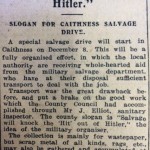In North Africa Rommel continued his offensive, raiding 15 miles into Egypt before withdrawing to refuel. Tobruk was finally relieved at this time. In Russia, German forces gained a bridgehead over the Moscow-Volga canal just 22 miles from the capital; another German army to the northwest reached to within 12 miles, but in each case Soviet counterattacks drove them back. To make matters worse, the temperature now fell below freezing and the Germans lacked adequate winter clothing. Also this week, on 26 November a Japanese fleet set sail for Hawaii, making for Pearl Harbor.
Across the county the very late harvest was still being gathered in, and disrupting school attendance. The Head 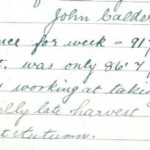 Teacher of Stemster School recorded in the log book on 28 November, “Attendance for week 91%; attendance in Senior Department was only 86.7%, this being caused by 3 boys working at taking in the corn. Exceptionally late harvest has been caused by very wet autumn.”
Teacher of Stemster School recorded in the log book on 28 November, “Attendance for week 91%; attendance in Senior Department was only 86.7%, this being caused by 3 boys working at taking in the corn. Exceptionally late harvest has been caused by very wet autumn.”
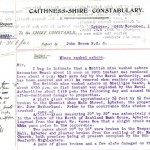 As a change from enemy mines being washed ashore on the Caithness coast, the inhabitants of Occumster and Lybster had to cope with British mines this week. The one at Occumster was rendered harmless, but the other at Shelligoe beach, Lybster, was blown up, breaking a number of glass windows. The
As a change from enemy mines being washed ashore on the Caithness coast, the inhabitants of Occumster and Lybster had to cope with British mines this week. The one at Occumster was rendered harmless, but the other at Shelligoe beach, Lybster, was blown up, breaking a number of glass windows. The 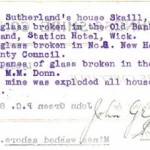 potential damage that such mines could cause is shown by the extent of the blast radius: properties were damaged as far afield as the chemists’ shop on Main Street, the North of Scotland Bank House, the Temperance Hall, as well as properties in Skaill and the Bay View Hotel. In addition, plaster was broken from the ceiling of St Mary’s Church. Helpfully, “Before the mine was exploded all householders were warned to open all windows.”
potential damage that such mines could cause is shown by the extent of the blast radius: properties were damaged as far afield as the chemists’ shop on Main Street, the North of Scotland Bank House, the Temperance Hall, as well as properties in Skaill and the Bay View Hotel. In addition, plaster was broken from the ceiling of St Mary’s Church. Helpfully, “Before the mine was exploded all householders were warned to open all windows.”
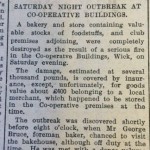 The John O’Groat Journal reported a serious fire at the Wick Co-operative Stores the
The John O’Groat Journal reported a serious fire at the Wick Co-operative Stores the
previous Saturday night. The fire seems to have started in the bakery, and the alarm was raised just before eight o’clock. Because it was a Saturday night it proved hard to get the town firemen assembled, but an RAF fire crew came to assist. “From the beginning it was obvious that the bakery and store, and adjacent premises belonging to Wick Women’s Club, were doomed,” the paper noted, and so it became a question of stopping the fire from spreading. One of the town firemen was overcome by smoke; and “one of the RAF firemen accidentally fell into the harbour while the hoses were being fixed for pumping operations”; luckily both men were rescued. At last the fire was brought under control after four or five hours, but the bakery, the Women’s Club and a quantity of flour and sugar was destroyed.
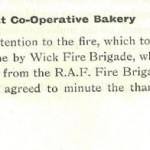 Wick Burgh Council formally recorded their thanks to the Fire Brigade at a meeting of 24
Wick Burgh Council formally recorded their thanks to the Fire Brigade at a meeting of 24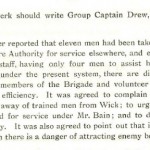 November, but noted that eleven men had been taken away from the Wick Fire Brigade for service elsewhere. They resolved to lodge a complaint and request the men be returned; “It was also agreed to point out that if fires cannot be properly dealt with there is a danger of attracting enemy bombers.”
November, but noted that eleven men had been taken away from the Wick Fire Brigade for service elsewhere. They resolved to lodge a complaint and request the men be returned; “It was also agreed to point out that if fires cannot be properly dealt with there is a danger of attracting enemy bombers.”
Finally this week, the John O’Groat Journal reported that Caithness was preparing for its latest salvage drive, primarily for wastepaper, but also for scrap metal and rags, and other potential salvage. Unlike in previous years lorries were being provided by the military to go round and collect it all. “The county slogan,” the paper announced with a straight face, “is “Salvage will knock the ‘Hit’ out of Hitler”, the idea of the military organiser.”